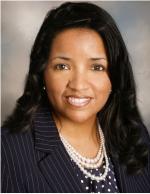“With inclusiveness, it’s critical to accept the contribution that you bring and to understand what the other folks bring to the table,” said Michelle Jenkins (right), senior manager for global compliance and reporting at EY—the event’s premier sponsor—during her keynote for the Inclusive Leadership Virtual Series (ILVS) on October 26. She shared the speech with her colleague Hao Nguyen, assistant director for tax global compliance and reporting at EY, who added that appreciating the full contributions of colleagues from all backgrounds can be disorienting: “When you challenge yourself, you challenge your own norms and biases.”
The keynote kicked off the week-long ILVS’s broader discussions of the importance of diversity and inclusion in the workplace and communities. Jenkins and Nguyen (left) pointed out that organizational diversity is not a new concept, as it is increasingly recognized that a diverse workforce and leadership team are not only a necessity but also a strategic asset. They shared experiences, perspectives, and solutions to common and often challenging circumstances, touching on their personal experiences as women of color to illustrate the importance of diversity and inclusion.
Because of the Covid-19 pandemic, the ILVS presentations, panel discussions, and case competition all took place online, along with company information and networking sessions. The event attracted more than 200 participants. “This year has proven to be challenging in more ways than one given all that has happened through this global pandemic, coupled with the civil unrest we have seen in our country,” says
Alaina Macaulay, Isenberg’s director of diversity and inclusion. “We were incredibly fortunate to use Zoom as our virtual platform this year, as these conversations are critical in ensuring Isenberg is doing all it can to be an anti-racist and inclusive organization. I’m grateful to my teammates on the planning committee who managed to transition an amazing in-person event in 2019 to a successful virtual event in a year of uncertainty. With many events being canceled this year, we knew that we couldn’t let down our students who were so excited to see the conversations continue from our inaugural event and truly learn about DEI in industry.”
THOUGHT LEADERS GO DEEP
After the Monday keynote, sessions took place each weekday evening. Monday’s panel focused on how leaders are learning how to navigate the pandemic, while still focusing on DEI efforts in an intentional and authentic way. These industry leaders gave great insight into how they are employing various tactics to help employees feel supported and heard during this pandemic. Whether it be an inclusion app, a podcast, or mental health help during the pandemic, these companies described rolling out myriad ways to support their marginalized communities during this time.
“We have to be more thoughtful and personal about how we make connections in the midst of this pandemic,” said panelist Erika Grimes, senior manager of financial services organizations at EY. Reese Blair, audit and assurance partner at Deloitte, agreed, adding, “In times of crisis, you’re really tested and get to see what you’re made of.” Other panelists included leaders from KPMG, Dell Technologies, PwC, and Grant Thornton.
During Tuesday’s session,
Michele Equale ’13 MBA, end-to-end process owner lead for workplace solutions at MassMutual, led a panel including leaders from EY, BDO, RSM, Grant Thornton, and Wayfair in a discussion focused on intersectional allyship, examining what makes a good ally, common mistakes one can make, and how to continually improve and educate oneself on privilege and oppression.
You’re all leaders when you join your organization,” said panelist Michael Duttlinger, senior manager for financial statement assurance services at EY. “You cannot wait for leaders to dictate how to advance diversity and inclusion. It’s up to you to decide how you want to move that forward day-to-day with your teams.”
Wednesday’s panel discussion engaged executives in a discussion about ways leaders can foster anti-racist work environments in a world where the #BlackLivesMatter movement has taken center stage.
“Gen Z and Millennials are already demanding that we change how we work,” said panelist
Tony Jordan ’95, partner at EY. “They are making it the norm to have these conversations.” He and his fellow panelists said they have observed the need for effective D&I practices and have been adapting accordingly—enforcing diversity commitments and embracing inclusive storytelling are just a few of the necessary steps they have been taking to create safe and actively anti-racist spaces.
When asked about methods for creating an anti-racist environment, Tracey Walker (left), VP of diversity and inclusion at RSM, discussed the process that the organization has in place to deal with confrontations in the workplace: “To build trust, state your intent, then give them the tools and hold them accountable.” Brendan Pommills (right), director and chief of staff of global supply chain operations at Wayfair, emphasized the importance of storytelling and actively listening to the stories that employees tell, which can lead to greater empathy within the organization.
All of the panelists agreed that the racial unrest in summer of 2020 reshaped the work landscape. According to Reese Blaire of Deloitte, “younger generations have remained steadfast, they’re speaking up and speaking loudly, and they will change the world.”
On Thursday evening, a group of recent alumni discussed ways to navigate a changing work culture. Moderated by senior
Trinity Monteiro, panelists reflected on their experiences at Isenberg and the organizations that influenced them and ultimately helped them to succeed in their careers.
Imani Erickson (left) ’19, an associate planner at TJX, shared that she attributes her success to Isenberg’s Partners in Education RAP (PiE) program, which provided her with confidence and connections. She is currently working on her company's Sustainability D&I Committee.
Ta-Von Wilson (right) ’14 was shaped by his experiences with Isenberg’s chapter of the National Association of Black Accountants, which he helped launch at the school. He has continued championing diversity at EY through EY Unplugged and various company initiatives.
One of the biggest challenges faced by the panelists since starting their careers has been imposter syndrome.
Rondale Davis ’13, senior management consultant at RSM, spoke about initially feeling out of place when he joined the workforce: As a Black man in a predominantly white space, he felt all eyes were on him. To counter his imposter syndrome he worked hard, proving to himself that he deserved to be there. He also emphasized the importance of being part of an organization that fully embraces diversity. When asked about how they have adapted to the challenges that 2020 has brought, the panelists praised their respective companies for being adaptive, inclusive and supportive.
ILVS CASE COMPETITION
Undergraduate students participating in the ILVS were able to take part in a case competition, which challenged them to better understand the thinking around inclusion and diversity in the workplace. The case, which was provided by EY, asked teams of three to four students to demonstrate critical thinking, strong presentation skills, teamwork, and time management. The groups discussed and solved real-world inclusion issues, taking away a deeper understanding of inclusion and diversity in the workplace, stronger presentation skills, professionalism, and a larger network of relationships.
Eleven teams competed, and of those, five became finalists. Members of the winning group, Team Martin, each received $250, and members of the two runner-up teams (Team Kantorovich and Team Kharfen) each received $100 prizes.
VIRTUAL NETWORKING WITH SPONSOR COMPANIES
During the company information sessions on the Friday of the ILVS week, UMass Amherst students explored internships with the event's sponsoring companies, all of which lead diversity, equity, and inclusion in their respective industries.
Alongside EY’s premier sponsorship, support from RSM, Dell, Deloitte, Grant Thornton, Wayfair, BDO, BNY Mellon, KPMG, PWC, and TJX allowed Isenberg to develop and present the ILVS.







